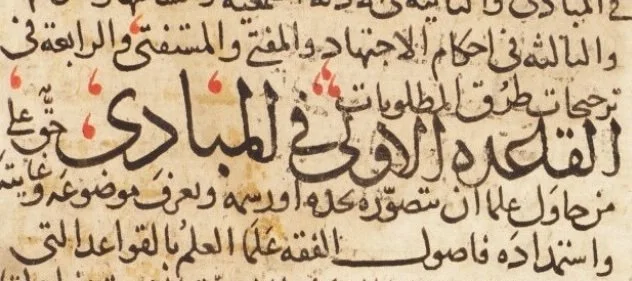“Islamic Legal Texts: In Depth”
Mediterranean Studies Summer Skills Seminar
11—14 August 2025 • Remote
The Summer Skills Seminar, “Islamic Legal Texts: In Depth” will be held via Zoom from Monday, 11 August to Thursday, 14 August 2025 from 9am to 11am and noon to 2pm MDT.
Course overview
This Summer Skills Seminar introduces participants to Islamic law. The seminar is focused on developing the skill of reading Islamic legal texts as opposed to surveying Islamic legal doctrines. It is designed for beginners seeking to build their capacity to investigate Islamic law.
Professor Ali will lead participants in a methodical reading of an introduction to Islamic law. Participants will read the chapters on legal obligation (taklīf) and ritual purity (ṭahāra) in Durūs tamhīdiyya fī l-fiqh al-istidlālī by Muḥammad Bāqir al-Īrawānī (b. 1949). In addition to the text itself, the course will cover selected topics in jurisprudence (uṣūl al-fiqh) and bio-bibliography (rijāl). Topics covered include: the meanings of ʿaql; the principle qubḥ al-taklīf bi-mā lā yuṭāq; repairing weak chains of transmission; exceptions to general rules and the principle of istiṣḥāb; al-shubuhāt al-miṣdāqiyya; al-tawthīqāt al-ʿāmma; tasālum versus ijmāʿ; al-qāʿida al-mirzāʾiyya; and al-sīra al-ʿuqalāʾiyya.
Participants are required to have intermediate Arabic,* but they are not required to have a background in Islamic law. The seminar will be held via Zoom over 4 days, with two 2-hour sessions each day. At the end of the seminar, participants will have gained some of the basic tools needed to read Islamic legal texts independently.
Previous Participants said:
“The seminar was very informative. I appreciated the level of detail and line-by-line explanation as I have not come across many academic spaces where this level of depth is covered, while also being at a reasonable pace with the opportunity to ask questions in real time. I also enjoyed looking at a text in a group setting alongside an expert with the chance to unpack it together.”
“The course met and exceeded my goals and expectations, providing a very in depth introduction to approaching these types of texts, as well as thorough explanations of the various methodologies and concepts employed within the text.”
“The course was a phenomenal experience and was extremely informative.”
“The text selection was excellent. It provided the ideal balance between engaging an important legal text directly and zooming out to review broader concepts in Islamic law. Aun patiently, generously, and kindly guided us through the text in an engaging manner.”
“The instructor's expertise is admirable, and he approached the subject matter with humor and passion (and compassion).”
“Professor Ali's instruction was outstanding. He provided thorough and helpful explanations of difficult topics, and I greatly benefited from his knowledge and mastery of the subject.”
“This course offered an unparalleled experience of jumping straight into reading a text of Islamic law in Arabic, and I would suggest it to anyone interested in incorporating the genre into their scholarship.”
Faculty
Aun Hasan Ali is an Associate Professor in the Department of Religious Studies at CU Boulder. He received his PhD from McGill University’s Institute of Islamic Studies. His research centers on Islamic intellectual history and he is the author of The School of Hillah and the Formation of Twelver Shii Islamic Tradition and the forthcoming Why Hadith Matter: The Evidentiary Value of Hadith in Imami Law (7th/13th to 11th/17th Centuries) (co-authored with Hassan Ansari). His recent publications include: “The Canonization of Nahj al-Balaghah between Hillah and Najaf: al-Sistani and the Iconic Authority of the Maraji,” “The Rational Turn in Imamism Revisited,” and “Some Notes on the History of the Categorization of Imami Hadith.”
Application & Information
Participants are required to have intermediate Arabic, but they are not required to have a background in Islamic law. Click here for a sample reading.
Please note: sessions will not be recorded; synchronous attendance is required.
The regular application period is until April 15 [Late registration to 28 July]
Applicants will be advised of acceptance on April 21. Payment of no less than 50% of the course tuition is due on April 28, with the balance due on May 7. Applicants waiting on a grant or subvention may request an extension for the second payment.
Late applicants may be accommodated if space remains. Full payment will be due within three days of acceptance, including a $50 surcharge for late applications.
All payments are final and non-refundable. A letter of confirmation/ receipt will be provided by the Mediterranean Seminar.
Apply via this form.
For further information or inquiries, contact mailbox@mediterraneanseminar.org subject: “Summer Skills Information”)
Fees
• $1100 for Full Professors, Librarians & Professionals
• $825 for tenured Associates, Emerita/us, Retired Faculty, Independent Scholars & Non-Academics;
• $575 for non-tenured Associates and Assistants, Postdoctoral Fellows & Graduate and Undergraduate students;
• $400 for Adjuncts, Lecturers & Contingent faculty.
Members of University of Colorado departments may be eligible for a discount.
Limited reductions are offered to applicants who are (1) nationals; (2) current residents; (3) AND faculty or students in low-per-capita GDP countries may apply for a reduction (the Low-GDP Bursary program).
Payment information will be provided at the time of acceptance. Posted fees do not include a 5% processing fee.
All fees are non-refundable.
With the collaboration of the International Center for Advanced Islamic Research (ICAIR).
How do we determine our fees?
Why have our fees gone up?
Can I get a reduction in fees?
What is the low-GDP Bursary program?
Proposed Program
Monday, 11 August 2025
9am—11am & noon—2pm
• The conditions for legal obligation: intellect
• The meaning of akhbarnā in al-Kāfī
• The meanings of ʿaql
• The conditions for legal obligation: capacity
• The principle qubḥ al-taklīf bi-mā lā yuṭāq
• ʿAmmār al-Sābāṭī
• al-Ḥasan b. Maḥbūb al-Sakūnī
• Repairing weak chains of transmission
• Exceptions to general rules and the principle of istiṣḥāb
Tuesday, 12 August 2025
9am—11am & noon—2pm
• The conditions for legal obligation: Islam
• The legal maxim al-islām yajubbu mā qablahu
• The conditions for legal obligation: maturity
• Ḥamza b. Ḥumrān
• ʿAbd al-ʿAzīz al-ʿAbdī
• Yazīd Abū Khālid al-Kunāsī
• Ṣafwān b. Yaḥyā versus Ṣafwān b. Mihrān al-Jammāl
• Conflicting reports
• The threshold of the principles of al-istiṣḥāb al-mawḍūʿī, al-istiṣḥāb al-ḥukmī, and al-barāʾa
• al-shubuhāt al-mawḍūʿiyya, al-shubuhāt al-ḥukmiyya, al-shubuhāt al-mafhūmiyya, and al-shubuhāt al-miṣdāqiyya.
Wednesday, 13 August 2025
9am—11am & noon—2pm
• Types of water: muḍāf
• qāʿidat al-ṭahāra
• Unqualified expressions in the Quran
• al-Qāsim b. Muḥammad al-Jawharī and al-tawthīqāt al-ʿāmma
• tasālum verses ijmāʿ
• Non-Imāmī narrators and Abū Jaʿfar al-Ṭūsī
Thursday, 14 August 2025
9am—11am & noon—2pm
• Types of water: muṭlaq
• kayfiyyat al-sarāyā and custom
• ʿadam jawāz al-tamassuk bi-l-ʿāmm fī l-shubha al-miṣdāqiyya
• al-qāʿida al-mirzāʾiyya
• al-sīra al-ʿuqalāʾiyya
Text
The only required text is Durūs tamhīdiyya by al-Īrawānī. All participants will be provided with a PDF.
Important dates:
Application period: 28 April 2025
Acceptance/stand by notifications: 5 May 2025
Full payment: 12 May 2025 (subject to extension for late applicants/ or pending grants)
NOTE: Numbers are limited; participants are encouraged to apply early.
Information
For general information regarding fees, enrollment, and administrative matters, contact the Mediterranean Seminar; for questions regarding seminar content and materials, contact the instructor directly.


